Featured Amicus Briefs
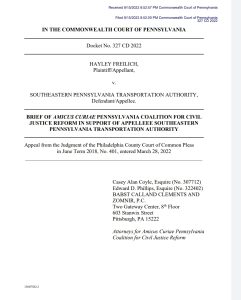
Sectors: Business, Community
FREILICH V. SEPTA
Summary: In this brief, PCCJR defends the constitutionality of legislatively impose caps on damages in cases brought against the Commonwealth and local governments, in Pennsylvania.
Status: Filed
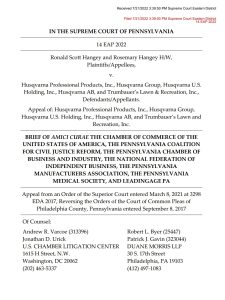
Sectors: Business, Community
Hangey v Husqvarna
Issue: Can a plaintiff sue a corporate defendant in a venue with which the corporation’s only relationship is an insubstantial and de minimis portion of its overall business and operations and where the venue lacks any other relationship either to the claim or to the other parties?
Status: n/a
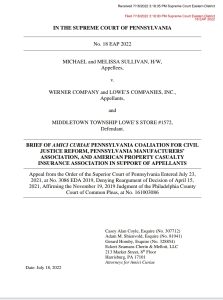
Sectors: Business, Health Care
Sullivan v Werner
This case raises the question of whether a jury should hear evidence of industry or governmental standards in design defect product liability cases. The Superior Court excluded this evidence even though the Tincher holding adopted negligence-based risk-utility analyses for design defect product liability cases.
Status: n/a
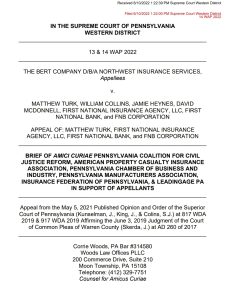
Sector: Business
Bert vs Turk
BRIEF OF AMICI CURIAE PENNSYLVANIA COALITION FOR CIVIL JUSTICE REFORM, AMERICAN PROPERTY CASUALTY INSURNCE ASSOCIATION, PENNSYLVANIA CHAMBER OF BUSINESS AND INDUSTRY, PENNSYLVANIA MANUFACTUERS ASSOCIATION, INSURANCE FEDERATION OF PENNSYLVANIA @ LEADING AGE PA IN SUPPORT OF APPELLANTS.
Status: n/a
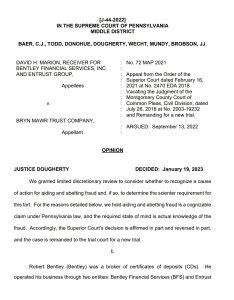
Sectors: Business, Community, Health Care
Marion V Bryn Mawr Trust
UPDATED
Issue: Should Pennsylvania recognize the tort of aiding and abetting fraud?
If the cause of action of aiding and abetting fraud is recognized, must a party have actual knowledge of the underlying fraud?
Status: filed
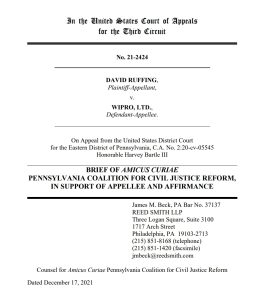
Sectors: Business, Community, Health Care
Ruffing V Wipro, LTD
This case was filed in the Third Circuit Court of Appeals. PCCJR urges the court to recognize US Supreme Court precedent and reject the concept of jurisdiction by virtue of registering to do business in Pennsylvania.
Status: n/a
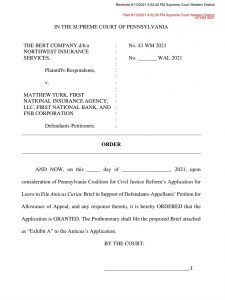
Sectors: Business, Health Care
Bert V Turk
At issue:
Unfair competition and Puntive damage ratio calculations.
Status: n/a
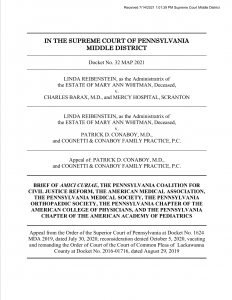
Sector: Health Care
Reibenstein vs. Conaboy
At issue:
1.Whether the Supreme Court should rule that “cause of death”, as it appears in MCARE’s statute of limitations (40 P.S. § 1303.513(d) (“Statute of Repose”)), refers to medical cause of death, and not “conduct leading to death” (or legal cause of death) as held by the Superior Court.
2. Whether the statute of limitations in a wrongful death or survival act claim may only be tolled under section 513(d) of MCARE (40 P.S. § 1303.513(d) (“Statute of Repose”)), where a plaintiff proves that the defendant against whom the claims are asserted (and not a third party) affirmatively misrepresented or fraudulently concealed decedent’s cause of death?
Status: Briefs filed
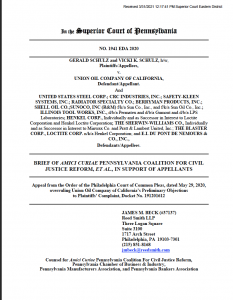
Sectors: Business, Health Care
Spencer vs. Johnson
The brief requests a reargument before an en banc panel of the Superior Court to overturn a decision of a Superior Court panel. The Court’s opinion in Spencer v Johnson concluded that the Fair Share Act’s provision apportioning damages based on the percentage of a defendant’s fault does not apply unless the plaintiff in the case is contributorily negligent. The court wrongly concluded that the Fair Share Act does not apply if the plaintiff has zero negligence.
Status: PCCJR’s application for leave to file an amicus brief requesting an en banc rehearing by the Superior Court was denied

Schulz vs. Union Oil Company of California
Is it constitutional to interpret Pennsylvania’s Long Arm Statute as conferring automatic personal jurisdiction solely because an out of state corporation has registered to do business in Pennsylvania?
Status: Briefs filed


